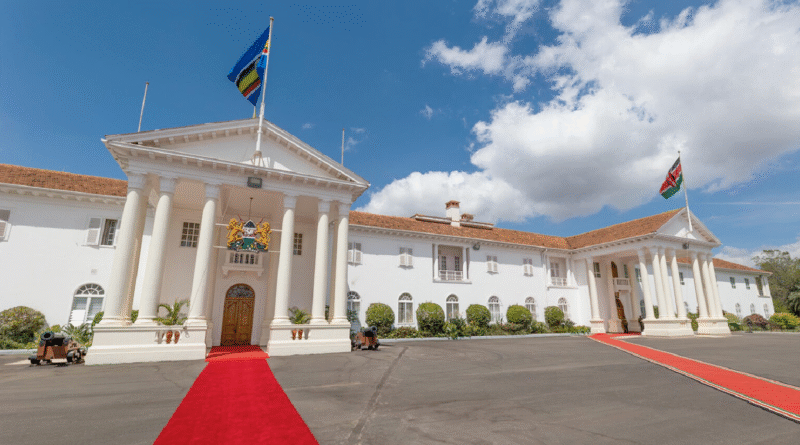Ruto’s Chapel Plan Sparks Debate in Kenya
Nairobi, Kenya, July 21, 2025, President William Ruto’s controversial plan to construct an 8,000 seat Christian chapel within the State House compound has sharply divided public opinion, with religious leaders, legal experts, and civil society groups voicing both passionate support and stern opposition.
The proposed mega church, which the president insists will be financed from his personal resources, is intended to replace existing makeshift iron-sheet structures that currently serve as places of worship for staff and guests within the presidential residence. However, critics argue that the project risks undermining Kenya’s secular constitutional framework and alienating non-Christian communities.
The initiative received a significant show of support on June 15, 2025, when Ruto hosted religious leaders from the Federation of Evangelical and Indigenous Christian Churches of Kenya at State House. During the event, Bishop Samuel Ngacha fiercely defended the project, branding opponents as “anti-Christ” and urging critics to consider Kenya’s Christian heritage. According to Ngacha, there are already two informal worship spaces Catholic and Protestant on the premises, and the president’s aim is merely to upgrade these facilities.
“If you see anyone who is against an altar, they must be anti-Christ,” Ngacha declared, emphasizing that the effort is rooted in spiritual purpose and national identity.
Mainstream Churches, Muslim Leaders Raise Concerns
Notably absent from the meeting were Kenya’s mainline church bodies, including the Evangelical Alliance of Kenya, the Kenya Conference of Catholic Bishops (KCCB), and the National Council of Churches of Kenya (NCCK). Several of their leaders have raised serious concerns about the implications of building a denominational church on public land.
Archbishop Jackson Ole Sapit of the Anglican Church of Kenya questioned the intent behind the chapel, warning that such a move could set a “dangerous precedent” and exclude religious minorities. He also queried whether the president’s frequent public prayers suggest he might assume a religious leadership role within the church.
Catholic Archbishop Philip Anyolo echoed these concerns, urging for clarity. “If the chapel is intended to serve all faiths, then it should be non-denominational,” he said, adding that religious inclusivity in public institutions must be maintained.
Muslim leaders have similarly challenged the President to demonstrate inclusivity by constructing a mosque within the State House if the aim is truly to reflect Kenya’s religious diversity.
Constitutional and Legal Backlash
The debate has intensified around the constitutional implications of the project. Article 8 of the Kenyan Constitution clearly states that “there shall be no state religion,” a clause that legal experts and human rights groups argue requires religious neutrality from the government.
Read Also: Texas on Mission: Bringing Hope to Hill Country After Devastating Floods
A petition challenging the legality of the proposed chapel has already been filed in the High Court and is set for hearing on July 24, 2025. Critics argue that building a Christian church on public land, even if funded privately, constitutes state endorsement of one religion over others.
Prominent opposition leader Martha Karua criticised the move as unconstitutional and unacceptable. “State House is public land. Not your land, not your money to do as you please. Completely out of order,” she said.
President Ruto has remained unapologetic and defiant amid the criticism. “I will not apologize to anyone for building a church. If the devil is angry, he can do what he wants,” he declared in response to growing public backlash.
Ruto also questioned media reports that the proposed chapel would cost Ksh1.2 billion ($9.2 million), pointing out that a comparable 11-story building was recently constructed for Ksh350 million ($2.7 million). He suggested the actual cost would be significantly lower.
State House Chaplain Benard Njagi supported the President’s position, stating that a budget of Ksh20 to 30 million ($155,000–$233,000) would be sufficient. Njagi explained that the request for a new facility came from State House worshippers due to the poor condition of the existing iron-sheet structures, which he said pose health risks to children and congregants.
Interestingly, Njagi’s proposal reportedly included plans not just for an Anglican and Catholic church, but also a mosque pointing toward a more inclusive vision for faith within the presidential grounds.
Public Frustration and Historical Parallels
Public frustration has also been fueled by widespread reports of economic hardship. Kenyans have expressed outrage that such a project is being prioritized amid a national crisis of underfunded schools, dilapidated hospitals, and delayed bursary payments for students. Critics have raised concerns about the project’s transparency and whether its location within the highly secured State House will hinder public accountability.
The controversy echoes a similar situation in Ghana, where former President Nana Akufo Addo’s pledge to build a national cathedral in 2020 stirred intense backlash. Though the Ghanaian leader also claimed to be honoring a vow to God, the project was later found to have used public funds and is now under investigation for corruption under President John Dramani Mahama, re-elected earlier this year.
As Kenya awaits the court’s decision, the State House chapel debate continues to reflect deeper national tensions over faith, governance, and public accountability. Whether the project proceeds or is halted, it has already sparked a vital conversation on the role of religion in a democratic and pluralistic society.
Content Credit | Ohida Oluwaferanmi
Image Credit | zenit.org




